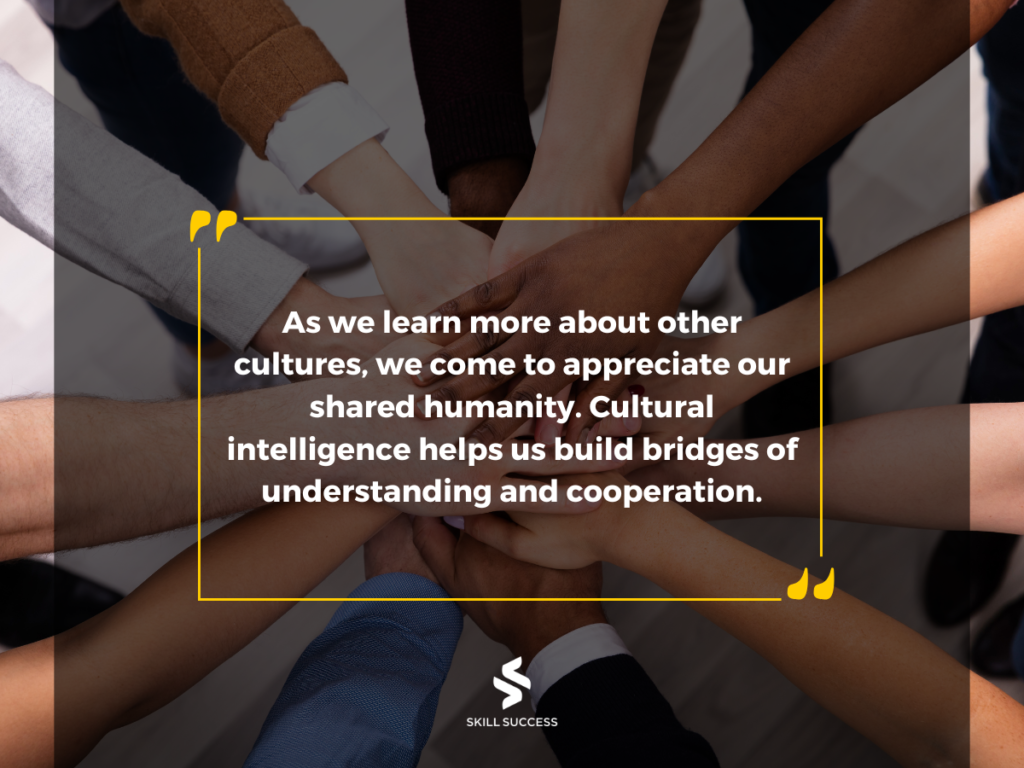
In many workplaces today, you might notice a wonderful mix of people from different backgrounds, cultures, and traditions. This beautiful blend of diversity creates a vibrant environment, sparking fresh ideas and innovative solutions. However, working with people from various cultures also calls for a special set of skills and understanding, which brings us to the concept of "Cultural Intelligence."
So, what is cultural intelligence?
Cultural intelligence (CQ) is the ability to understand and interact effectively with people from different cultures. It is a complex skill that involves four components:
- Motivation: The desire to learn about other cultures and to be open to new experiences.
- Knowledge: The understanding of different cultures and how they can differ from your own.
- Skills: The abilities to communicate effectively with people from other cultures and to build relationships with them.
- Behavior: The ability to act in a way that is appropriate in different cultural settings.
Cultural intelligence is important in today's globalized world, where people from all over the world work together. By understanding and respecting different cultures, you can build stronger relationships with your colleagues and clients, and be more successful in your career.
Here are some statistics that shed light on the immense benefits of diversity and inclusion in the workplace:
- Diverse companies have a 70% higher chance of tapping into new markets. (Harvard Business Review)
- Diverse companies see 83% higher engagement among millennials. (Deloitte)
- Diverse teams excel in decision-making by 87% compared to homogenous groups. (Forbes)
Cultural intelligence is one of the important soft skills that we must learn in order to thrive in business. There are many ways to improve this skill, including gaining insights from personal experiences, enrolling in courses or seeking mentoring, and seeking expert advice from individuals who have practical experience with it.
We interviewed experts in business and cultural intelligence to share their experiences and valuable advice. They will guide us through the significance of cultural intelligence in today's ever-changing business world.

Expert Roundup: Ways to Develop Cultural Intelligence
Start with Awareness
"At our US-based brokerage, for instance, we start with awareness: encouraging employees to identify and question their own cultural biases. We also invest in training that emphasizes empathy, communication skills, and diverse cultural practices. And probably most importantly, we promote exposure to different cultures, which fosters a multicultural work environment."
Teresha's approach emphasizes the importance of cultural sensitivity in business, especially when dealing with international clients. Understanding and adapting to their cultural nuances can lead to successful deals and long-term client relationships.
Here are some specific activities you can do to start with awareness:
- Be mindful of your own cultural context: How does your own culture shape your beliefs and values? How does it shape your way of thinking and communicating? Being mindful of your own cultural context will help you to understand how your own culture influences your interactions with people from other cultures.
- Identify your own cultural biases: What are your assumptions about people from different cultures? What are your stereotypes? Once you know your own biases, you can start to challenge them.
- Talk to people from different cultures: One of the best ways to learn about different cultures is to talk to people from those cultures. Ask them about their culture, their customs, and their beliefs.
- Read books and articles about different cultures: There are many great books and articles available that can teach you about different cultures. Some of my favorites include:
- "The Culture Map" by Erin Meyer
- "Do's and Taboos Around the World" by Roger E. Axtell
- "The Book of Worldly Wisdom" by Lawrence E. Harrison
Expand Your Network
"Expand your network beyond your region. As long as you keep your social circle confined to your geographic location, you’ll always be limited in your cultural understanding and worldview. Deliberately seeking more diverse connections pushes you to become more mindful of the unique contributions different professionals could bring to the international business table."
Stephen Baldwin emphasizes the importance of expanding one's social circle beyond one's local or regional community. When individuals limit their network to their geographic location, they may inadvertently miss out on the rich experiences and unique contributions that professionals from different backgrounds can offer.
Additional advice from Stephan: "Research your international partner’s cultural background before meeting them..."
"Research your international partner’s cultural background before meeting them. This buys you time to understand the social, religious, and political factors that may influence the decisions they want to make within your partnership. You can use that insight to brainstorm possible compromises that benefit you both. Being proactive about this could save you from conflicts that damage your reputation."
Stephan also advises that before meeting with international partners, it is essential to conduct thorough research on their cultural backgrounds. Understanding the social, religious, and political factors that might influence their decision-making within the partnership is crucial.
Importance of Developing Negotiation Skills:
- Negotiation is a key skill in today's globalized world: With businesses increasingly operating across borders, the ability to negotiate effectively with people from different cultures is essential.
- Negotiation can help you to get what you want: Whether you are negotiating a salary, a contract, or a business deal, the ability to negotiate effectively can give you a significant advantage.
- Negotiation can help you to build relationships: When you negotiate in a fair and respectful manner, you can build trust and rapport with the other party. This can lead to long-term relationships that are beneficial to both parties.
Read more: How to Develop Negotiation Skills?

Practice Cultural Immersion
"Encouraging employees to immerse themselves in different cultures through travel, studying abroad, or participating in cultural exchange programs can broaden their understanding and appreciation of diverse perspectives."
So, what is cultural immersion?
Cultural immersion is the process of learning about a culture through direct experience. By doing this, we become better at working with people from different backgrounds, communicating with them, and making great business decisions.
Kurt says firsthand exposure allows individuals to experience different cultural norms, traditions, and ways of thinking, fostering empathy and adaptability.
Kurt suggests that organizations should:
- Offer supportive resources: Provide employees with resources such as language learning materials, cultural guides, or online courses to prepare them for cultural immersion experiences.
- Offer incentives and rewards: Recognize and reward employees who actively participate in cultural exchange programs or showcase cultural intelligence in their work.
- Promote global collaboration initiatives: Encourage cross-border collaboration within the organization to foster interaction and understanding among employees from diverse cultural backgrounds.
Tips for employees to practice cultural immersion:
- Travel and explore: Travel to different countries or regions with diverse cultures. Immerse yourself in the local customs, traditions, and everyday life to gain firsthand experiences and insights.
- Learn a new language: Take language classes to communicate better with people from different cultures. Learning a new language can open doors to understanding and connecting with others on a deeper level.
- Engage in cross-cultural interactions: Seek opportunities to interact with people from diverse backgrounds, whether through networking events, social gatherings, or online forums.
- Be curious and ask questions: Show genuine curiosity about other cultures and be open to learning from others. Ask respectful questions to gain insights into their beliefs, practices, and perspectives.
Adapt Communication Styles and Customs
"The ability to modify communication, negotiation, and business tactics while honoring regional traditions and preventing misunderstandings is a skill that business professionals who possess cultural intelligence can use."
One crucial skill that professionals with cultural intelligence possess is the ability to adapt their communication styles and business tactics while respecting regional traditions.
There are many ways to adapt communication styles and customs. Here are a few tips:
- Be aware of the different cultural norms for communication: For example, in some cultures, it is considered rude to make direct eye contact, while in other cultures, it is considered a sign of respect.
- Be respectful of the other person's culture: This means avoiding making assumptions about their culture and being mindful of your own cultural biases. In some cultures, people eat with their hands, while in others, they use utensils like forks and spoons. If you're dining with someone from a culture that eats with their hands, be respectful and avoid judging or feeling uncomfortable about it.
- Be flexible: Be willing to adjust your communication style to accommodate the other person's culture. For example, if you are interacting with someone from Japan, where bowing is a common sign of respect, you should be mindful to bow instead of using handshakes, which are more typical in the United States.
Learn about Similarities and Differences
"One can increase their CQ knowledge by learning about the similarities and differences between cultures. Get to know your employees/coworkers and their values. When you are faced with cultural differences, take the time to develop a strategy for the interaction. This will help you become comfortable adapting when relating and working in multicultural contexts."
Cheryl Seminara, a certified CQ facilitator, shares a personal example in her book, "My Father is Not a Genius. Life Lessons from the Wisest Person That I Know." Growing up as an only child of Sicilian descent in the Boston area, she encountered various stereotypes and assumptions about her background.
Through developing her cultural intelligence, Cheryl was able to adapt her communication and leadership style effectively in different settings, leading to success and effectiveness.
There are many tips to learn about the similarities and differences between cultures. Here are a few:
- Be open-minded: It is important to be open-minded when learning about different cultures. Don't make assumptions about other cultures, and be willing to learn new things.
- Focus on the big picture: When learning about different cultures, it is important to focus on the big picture. This means understanding the values, beliefs, and customs that are common to a particular culture.
- Be curious: The most important thing is to be curious about other cultures. This means being open to new experiences and being willing to learn new things.

Small-Scale Testing
Taking big decisions or actions without testing them on a smaller scale can be risky. It's like diving into the deep end of a pool without checking the water first. Small-scale testing lets you dip your toes in first, get feedback, and make improvements before going all-in. It's a smart way to avoid big mistakes and ensure success in the long run.
Carl Jenson, Founder of Compare Banks, shares:
"If at all possible, think about evaluating your choices on a smaller scale before putting them into action entirely. This enables you to get input, evaluate results, and adapt as necessary. You may improve your strategy and raise your likelihood of succeeding by making decisions iteratively upon evaluation in the actual world."
Here are some tips on how to do small-scale testing:
- Start small: Don't try to test too many things at once. Start with one or two ideas and see how they work.
- Be specific: When you are testing a decision, be specific about what you are testing. What are you trying to achieve? What are the different outcomes that you are hoping for?
- Get feedback: Talk to people you trust and get their opinions on your decisions. This will help you to see your decisions from different perspectives and to identify any potential problems.
- Be patient: It takes time to get feedback and make adjustments. Don't give up if your first few tests don't work out. Keep testing and adjusting until you find something that works.

Leading with Success: 5 Tips for Managing a Diverse Team
As a leader of a diverse team, one of the top leadership skills you must improve is cultural intelligence. Embracing cultural intelligence empowers you to navigate the complexities of a diverse workplace and foster a harmonious and high-performing team. Here are my top tips for leading with success:
- Promote team collaboration: Encourage collaboration among team members, regardless of their backgrounds. Foster a sense of unity and teamwork to capitalize on the strengths of each individual and build a cohesive and high-performing team.
- Create an inclusive environment. Make sure that everyone feels welcome and valued, regardless of their background or culture.
- Be willing to listen and learn. Be open to feedback from your team members and be willing to change your approach if it's not working.
- Be open-minded and respectful of others. Be willing to learn about other cultures and perspectives and be respectful of the different ways that people communicate and work.
- Be clear and consistent in your communication. Use language that is clear and easy to understand, and be consistent in your expectations and feedback.
- Improve emotional intelligence: Work on improving your emotional intelligence as a leader. Understanding and managing emotions, both in yourself and others, will enable you to navigate challenges and conflicts with empathy and grace.

Busting Myths about Cultural Intelligence
As someone who has had a lot of international experiences, I've come across a number of myths about cultural intelligence. These myths harm growth by hindering CQ development and undervaluing cultural intelligence in our globalized world.
In this section, I'll debunk the prevalent CQ myths, drawing on my personal experiences to expose their falsehoods.
Myth 1: Cultural intelligence is only relevant for international business
Fact: Cultural intelligence matters beyond borders. In our global world, diversity is everywhere – in schools, communities, and workplaces. It helps in teamwork, communication, and understanding in any diverse setting.
Myth 2: Cultural intelligence means knowing every culture
Fact: No need to be an expert in every culture. Being open and willing to learn when interacting with different people is essential. Respect and understanding matter more than knowing every detail.
Myth 3: Cultural intelligence is innate and cannot be developed
Fact: Cultural intelligence can grow. Education, experience, and self-reflection can improve it. Embrace diversity to build cultural intelligence.
Myth 4: Cultural intelligence is only about language
Fact: Language is just one part of cultural intelligence. Non-verbal cues, values, and traditions are vital too for successful cross-cultural interactions.
Myth 5: Cultural intelligence leads to assimilation
Fact: No need to give up your identity. Cultural intelligence is about adapting with respect, not losing yourself. Embrace diversity to enrich your understanding.
Myth 6: Cultural intelligence is only for expatriates or foreign workers
Fact: Cultural intelligence is for everyone, not just those in foreign countries. In diverse societies and workplaces, cultural intelligence helps connect and communicate.
Myth 7: Cultural intelligence solves all cross-cultural challenges
Fact: Cultural intelligence is valuable but not a magic fix. Structural issues also play a role in cross-cultural interactions.
Myth 8: Cultural intelligence is only about tolerance
Fact: Cultural intelligence goes beyond tolerance. Embrace, learn, and appreciate diversity to foster genuine understanding.
I hope you learn from these facts and apply them in your future interactions. Embracing cultural intelligence can lead to stronger connections, greater understanding, and a more inclusive and harmonious world.

Frequently Asked Questions about Cultural Intelligence
What is Cultural Intelligence (CQ)?
Cultural Intelligence (CQ) is the ability to understand, interact, and adapt effectively to diverse cultures. It involves being aware of cultural differences, respecting various customs, and successfully navigating cross-cultural interactions.
Why is cultural intelligence important in the workplace?
Cultural Intelligence is crucial in the workplace as it enhances teamwork, communication, and collaboration among employees from diverse backgrounds. It fosters an inclusive work environment, improves problem-solving, and facilitates successful international business ventures.
Can cultural intelligence be developed?
Yes, cultural intelligence can be developed and improved over time. By actively seeking to understand and appreciate different cultures, individuals can enhance their CQ through education, exposure, and personal reflection.
What are the components of cultural intelligence?
Cultural intelligence comprises four components: Cognitive CQ (knowledge and understanding of cultures), Emotional CQ (managing emotions in diverse settings), Physical CQ (adaptation to diverse environments), and Motivational CQ (the willingness to engage with different cultures).
How does cultural intelligence differ from cultural awareness?
Cultural intelligence goes beyond cultural awareness, which involves recognizing cultural differences. CQ involves understanding, adapting, and effectively interacting with individuals from various cultures, taking into account their customs and perspectives.
Can cultural intelligence help in international business dealings?
Yes, cultural intelligence is invaluable in international business. It allows professionals to navigate cultural nuances, build strong relationships with clients and partners, and avoid misunderstandings that could hinder successful negotiations and collaborations.
Can cultural intelligence benefit my personal life?
Yes, cultural intelligence is beneficial in personal life too. It enhances communication and understanding in diverse social settings, helps develop empathy towards others, and fosters meaningful connections across cultures.
What are some challenges in developing cultural intelligence?
Some challenges in developing cultural intelligence may include overcoming biases and stereotypes, adapting to unfamiliar cultural norms, and being aware of one's cultural lens that may influence perceptions and behaviors.
How can organizations promote cultural intelligence among employees?
Organizations can promote cultural intelligence by offering diversity and inclusion training, providing cultural awareness resources, encouraging cross-cultural collaborations, and fostering a work environment that values and respects different perspectives and backgrounds.
Key Takeaways
Cultural Intelligence in today's diverse and interconnected business landscape. Let's heed the advice of these experts and apply their valuable tips in our personal and professional lives.
As we dispelled myths and embraced facts, we discovered the power of cultural understanding in today's globalized world. Now, it's time to put this knowledge into action.
Cultural intelligence is not an elusive trait but a learnable soft skill that anyone can cultivate. To continue growing, subscribe to Skill Success All Access Pass for unlimited courses. Expand your knowledge, refine your skills, and become a true cultural intelligence advocate.
Let's build a more inclusive and harmonious world, one culturally intelligent step at a time.

